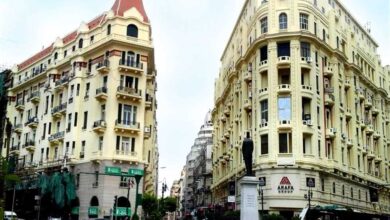
Almost all local newspapers highlight the massive stock market plunge on their front pages Monday. In the third largest single-day drop since January 2011, the country’s stock market lost LE29.3 billion of total market capitalization Sunday.
State-run Al-Ahram simply states that this is the biggest plunge in 22 months, and is the effect of “deep political division” on the streets after President Mohamed Morsy’s constitutional declaration, which he announced Thursday and which gave him several new powers. The paper quotes Mohamed Omran, chairman of the Egyptian Exchange, as saying that the market would not close under any circumstances. Past experience has shown that closing the market has a more adverse effect on investor sentiment.
Privately owned Youm7 leads with the headline “The stock market is collapsing … and the country is on a volcano,” saying that the clashes in Tahrir Square are the main cause of the market plunge, and that protesters were hit by birdshot in Tahrir. The paper adds that 35 political parties continue to demonstrate against the constitutional declaration and are calling for a million-man protest tomorrow.
State-owned Al-Akhbar goes with the same sentiment. “The stock market collapses,” it states in bold red, referring to yesterday as “Black Sunday.” The paper attributes the losses to “deep political division” as well as the ongoing sit-in by protesters in Tahrir and different governorates. Privately owned Al-Watan also dubbed yesterday as “Black Sunday in the stock market” on its front page.
The front page of independent daily Al-Tahrir states that the “pharaonic” constitutional declaration has crushed the stock market, leading it to lose LE29 billion in one session. The front page refers to Morsy as a pharaoh and accuses him of splitting Egypt, against a backdrop of a photo of protesters running from Central Security Forces toward Tahrir. Another photo shows protesters standing around a huge block of letters on the floor where “Leave, Morsy” was written. The word is reminiscent of the 25 January uprising that ousted former President Hosni Mubarak — a multitude of protesters all over the world had held signs that demanded Mubarak “leave.”
Practically the only local newspaper with no mention of the stock market plunge whatsoever is the Freedom and Justice paper, known as the Muslim Brotherhood’s mouthpiece. The paper leaves out all mention of the collapsing economy, and instead focuses on calls for a “million-man protest” tomorrow, organized by the Brotherhood, to support the president’s decrees. The protest will be held in front of Cairo University, while those who oppose the decrees will be protesting simultaneously at Tahrir.
Freedom and Justice continues to contradict most other papers by bluntly stating on its front page that “Courts continue to operate normally; the calls to strike have failed.” The Judges Club had called for courts to strike in response to Morsy’s constitutional declaration, which immunized his decisions from judicial oversight. Judges said Morsy’s decree is a violation of judicial authority. The club’s head, Ahmed al-Zend, called for courts to suspend their work.
The paper maintains that courts around the country have not responded to these calls, despite reports that courts in different governorates, such as Alexandria, Damanhour and Minya, suspended work for the second day Sunday.
Al-Tahrir reports that the calls for courts to suspend their work in protest of the constitutional declaration have been quite effective, with full strikes in effect in seven different governorates, while seven other governorates have proceeded with partial strikes.
Even Al-Ahram, long referred to as the government mouthpiece, concedes that except for a certain few, most courts and prosecutors have suspended their work in protest of the constitutional declaration, while adding that the Lawyers Syndicate also disagrees with the latest presidential decrees, and that lawyers are willing to join the courts’ strike. Sameh Ashour, head of the syndicate, announced that it too would be joining demonstrations in Tahrir.
Al-Akhbar’s front page shows a photo of a disgruntled woman looking into the camera, with her two young children smiling shyly next to her. The caption reads, “Woman and her children upset because son’s case has been postponed due to the judges’ strike.”
Meanwhile, state-run Al-Gomhurriya dedicates a substantial piece of its front page to news about mass sexual harassment in Simon Bolivar Square. It reports that a woman who was “dressed in revealing clothes” was assaulted by hundreds of men in broad daylight Sunday at noon. The men reportedly chased after the woman and managed to rip off her green pants, the paper reports, until others stepped in and managed to get her into the nearby Mugamma administrative building in Tahrir Square, and locked the doors to keep the mob away.
Egypt’s papers:
Al-Ahram: Daily, state-run, largest distribution in Egypt
Al-Akhbar: Daily, state-run, second to Al-Ahram in institutional size
Al-Gomhurriya: Daily, state-run
Rose al-Youssef: Daily, state-run
Al-Dostour: Daily, privately owned
Al-Shorouk: Daily, privately owned
Al-Watan: Daily, privately owned
Al-Wafd: Daily, published by the liberal Wafd Party
Youm7: Daily, privately owned
Al-Tahrir: Daily, privately owned
Al-Sabah: Daily, privately owned
Freedom and Justice: Daily, published by the Muslim Brotherhood’s Freedom and Justice Party
Sawt al-Umma: Weekly, privately owned
Al-Arabi: Weekly, published by the Nasserist Party
Al-Nour: Official paper of the Salafi Nour Party




